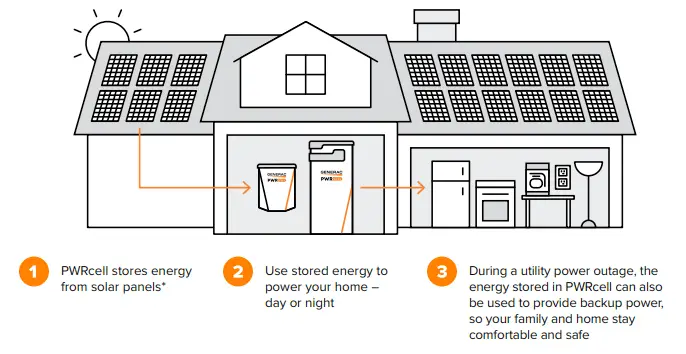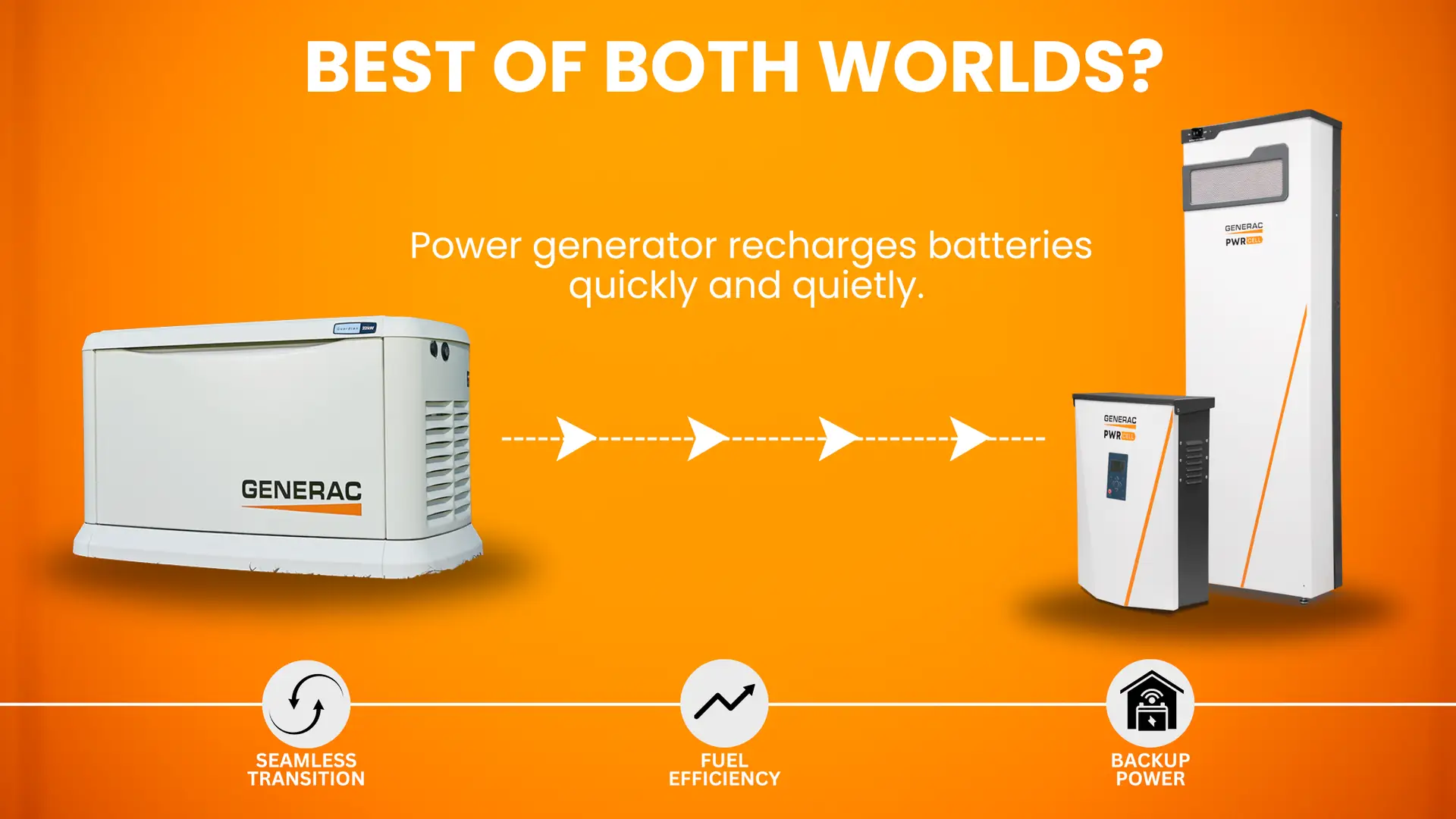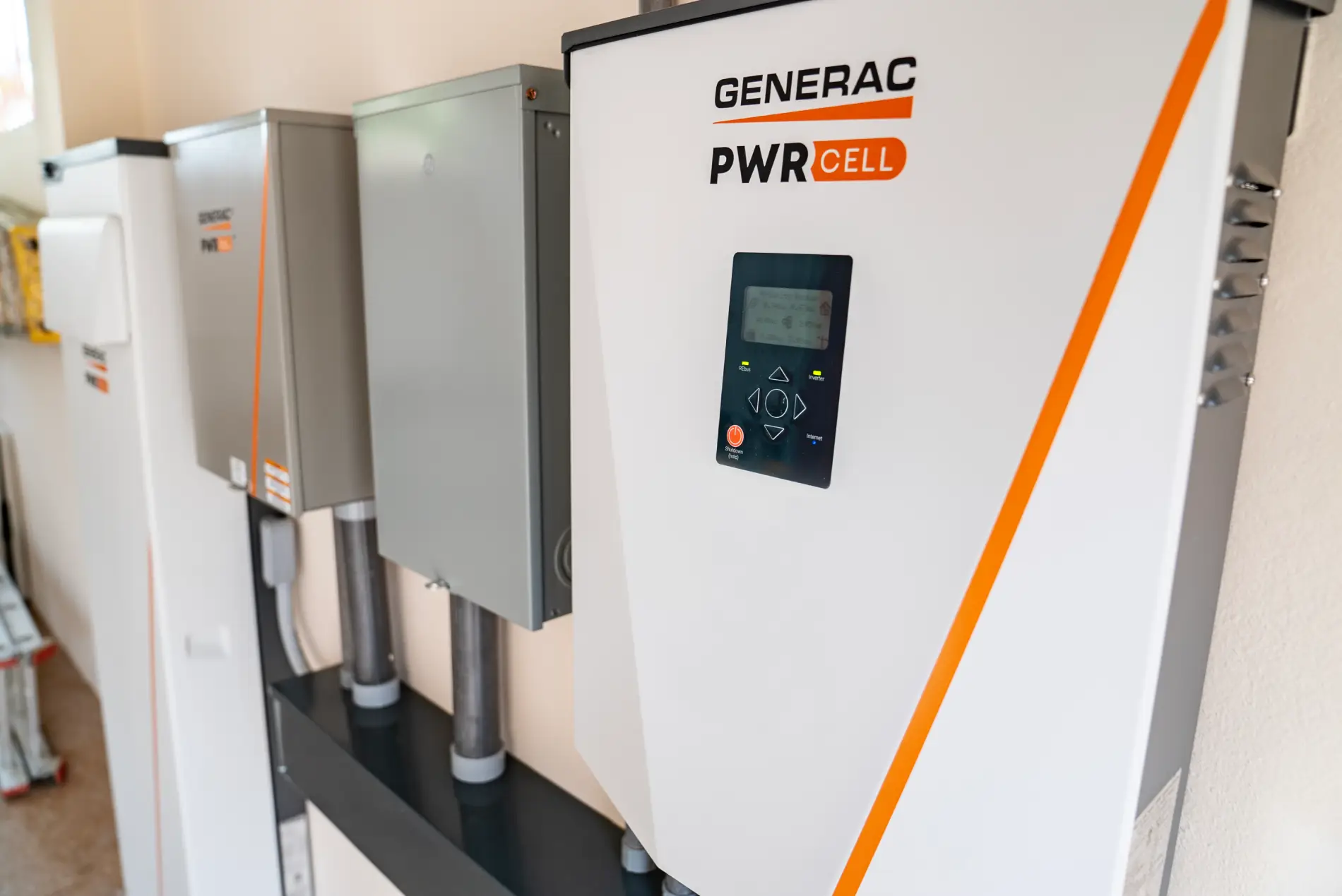Whether you’re preparing for outages caused by storms, ensuring uninterrupted power for critical appliances, or simply seeking energy independence, the right backup battery solution can provide peace of mind and long-term value.
In the Greater Puget Sound area, the best backup power solution depends on your location, energy goals and budget. Homeowners today have three primary options: solar + battery, generator + battery, or a combination of all three systems. Each offers unique benefits and considerations, from cost and reliability to environmental impact and maintenance requirements.
This blog will explore how these systems work, highlight their key advantages, and weigh their trade-offs. By understanding these options in detail, you’ll be equipped to choose the system that best meets your energy needs, lifestyle, and priorities for Pacific Northwest energy independence.

What is a Solar and Battery System?
A solar and battery system combines solar panels with a battery backup to provide renewable energy and store excess power for later use. The solar panels collect sunlight and convert it into electricity, which powers your home during the day. Any extra energy is stored in the battery for use at night or during power outages.
A solar and battery system is ideal for homeowners who prioritize reduction or elimination of their utility costs and are also looking for a reliable backup power source during outages. The seasonal windstorms in the extended Seattle area from the foothills to the coast make this system attractive for their reliability regardless of weather conditions.
However, it is necessary to have ample solar during the winter months so the solar panels can recharge the battery on a daily basis. If so, this system can keep a PNW home powered for days and weeks while cutting the cost of an electricity bill. Resiliency Benefits of Solar Batteries | EnergySage
Benefits:
- Renewable Energy: Solar power reduces your carbon footprint.
- Lower Utility Bills: By storing and using your own energy, you rely less on the grid.
- Silent Operation: Unlike generators, solar and batteries are noise-free.
- Incentives Available: Federal tax credits and local incentives can reduce installation costs.
What is a Battery Backup with Generator System?
A battery backup with a generator system combines a traditional fuel-powered generator with a battery for added flexibility and reliability. The generator produces electricity during power outages and recharges the battery, which stores energy to power your home efficiently. The battery reduces the need for the generator to run continuously, offering quieter operation and fuel savings. Generac Pwrcell Review: A Modular Solar Battery – CNET
A battery backup with generator system is ideal for homeowners in areas where solar isn’t practical due to limited sunlight or space. It’s a reliable and cost-effective option for ensuring uninterrupted power, though it may not align with environmental or long-term energy savings goals. Please be advised that a generator is powered by fossil fuel and does not qualify for the federal tax credit, nor the tax waiver in Washington state.
Benefits:
- Reliable Backup Power: Generators provide consistent power, especially during extended outages.
- Not Weather Dependent: Generators function regardless of sunshine or weather conditions.
- Lower Upfront Cost: Generators typically cost less than solar panels.
- Scalable for Large Loads: Great for powering energy-intensive appliances.
Trade-Offs:
- Noise: Generators are loud and may disturb your household or neighbors.
- Environmental Impact: Generators emit greenhouse gases and rely on fossil fuels.
- Fuel Supply: During emergencies, accessing fuel can be challenging.
- Less Sustainable: Compared to solar, generators don’t contribute to long-term energy independence.

What is a Battery Backup with Generator System?
A battery backup with a generator system combines a traditional fuel-powered generator with a battery for added flexibility and reliability. The generator produces electricity during power outages and recharges the battery, which stores energy to power your home efficiently. The battery reduces the need for the generator to run continuously, offering quieter operation and fuel savings. Generac Pwrcell Review: A Modular Solar Battery – CNET
A battery backup with generator system is ideal for homeowners in areas where solar isn’t practical due to limited sunlight or space. It’s a reliable and cost-effective option for ensuring uninterrupted power, though it may not align with environmental or long-term energy savings goals. Please be advised that a generator is powered by fossil fuel and does not qualify for the federal tax credit, nor the tax waiver in Washington state.
Benefits:
- Reliable Backup Power: Generators provide consistent power, especially during extended outages.
- Not Weather Dependent: Generators function regardless of sunshine or weather conditions.
- Lower Upfront Cost: Generators typically cost less than solar panels.
- Scalable for Large Loads: Great for powering energy-intensive appliances.
Trade-Offs:
- Noise: Generators are loud and may disturb your household or neighbors.
- Environmental Impact: Generators emit greenhouse gases and rely on fossil fuels.
- Fuel Supply: During emergencies, accessing fuel can be challenging.
- Less Sustainable: Compared to solar, generators don’t contribute to long-term energy independence.
What is a Solar + Battery Backup + Generator System?
A solar + battery backup + generator system combines the benefits of renewable solar energy, energy storage in a battery, and a generator for extended reliability. Solar panels produce electricity and charge the battery during sunny periods, while the generator provides power and recharges the battery during prolonged outages or low solar production, such as on cloudy days or at night.
The best thing about a solar + battery + generator system is its unmatched reliability and flexibility. Solar powers your home daily, the battery stores energy for nighttime or short outages, and the generator ensures power during extended emergencies. It’s a versatile, all-weather solution that provides peace of mind, saves money on your utility bill and energy independence. Understanding the Integration of a Generator with a Solar Battery Storage System – Generator Wisdom
Benefits:
- Maximum Reliability: Solar and batteries handle daily energy needs, while the generator acts as a failsafe during extended outages.
- Optimized Battery Use: Generators supplement heavy loads, preserving battery life for critical circuits.
Sustainable with Backup: Solar provides clean energy while the generator fills in gaps.
- Energy Independence: Reduces reliance on the grid entirely.
Trade-Offs:
- Highest Upfront Cost: Combining all three systems requires a significant initial investment.
- Complexity: System integration and maintenance are more involved.
Partial Environmental Impact: While solar is clean, generators still rely on fossil fuels.
Comparison of Solar + Battery, Generator + Battery, and All Three


Choosing the Right Installer for Solar + Battery, Generator + Battery, and Combined Systems
When selecting an installer for your solar + battery, generator + battery, or solar + generator + battery system, it’s crucial to find a provider with the right expertise, certifications, and a strong track record. Look for companies with experience in integrating complex systems, as combining solar panels, batteries, and generators requires advanced technical knowledge. Ensure the installer is certified for the specific brands of batteries and generators you’re considering (e.g., Tesla, Generac) and has positive reviews that highlight customer satisfaction and reliability.
A reputable installer will provide a transparent process from start to finish. During the bid phase, they should assess your energy needs, home layout, and goals, offering a customized solution with detailed cost breakdowns. Once you agree on a plan, the installation process should be clearly communicated, including timelines, permits, and inspections. After installation, a good installer provides ongoing support, including system monitoring, warranty guidance, and regular maintenance options to ensure your investment performs as expected. Clear communication and follow-up services are key indicators of a dependable partner in your energy journey.
Backup power systems like solar + battery, generator + battery, and solar + battery + generator each offer unique advantages. Solar + battery systems are great for sustainable energy use and lower utility bills but may be less reliable during prolonged outages. Generator + battery setups provide dependable backup power in any weather but rely on fuel and produce emissions.
Combining all three—solar + battery + generator—offers the best of both worlds: clean energy for daily use, battery storage for short outages, and generator support for extended emergencies. While this option ensures maximum reliability, it comes with a higher upfront cost and more maintenance. The best choice depends on your energy needs, budget, and priorities.

